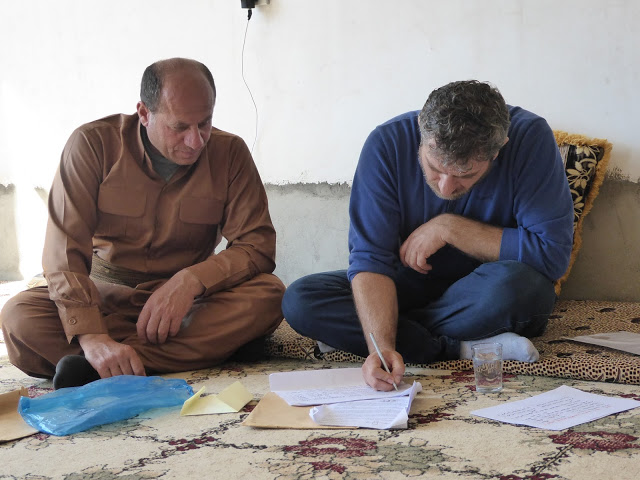CPTnet
8 April 2016
IRAQI KURDISTAN: Oil
companies continue to steal and destroy land
 On 29 February 2016 two CPT-Iraqi
On 29 February 2016 two CPT-Iraqi
Kurdistan team members went to the community of Hajji Ahmed to meet with Kak
Miro, the village leader. Villagers have been struggling to maintain
their land rights and have also been trying to gain adequate
compensation for lands already confiscated by Exxon Mobil. CPT has
been helping to amplify the voices of villagers since August 2013.
Exxon Mobil has finished one
oil well and capped it for later use in a nearby field. During this process,
the company, with the assistance of the Kurdistan Regional Government,
appropriated land from local farmers. The construction and drilling polluted
some of the land, causing plants, trees and vines to suffer or die. Kak
Miro has heard that digging for a second well is to start soon.
Kak Miro asked the team to help him write a
letter to the Committee of Human Rights and Natural Resources of the Kurdistan
Parliament about not receiving any compensation for his lost and
damaged land. He was waiting for a phone call from a committee member to
set an appointment to deliver the letter.
As Kak Miro began drafting the letter,
his phone rang. A Parliament member (PM) had called to say that he was
ready to come to Hajji Ahmed in person, whenever the letters were ready.
Kak Miro told the PM that CPT was with him helping to write the letter. The PM
agreed to speak with a Kurdish CPTer and gave advice on how to formulate the
letter and which information to include.
Before lunchtime, team members drove to the
oil field. As they approached the site, they saw that, unlike during CPT’s last
visit, all the company’s staff had left the project and only few guards stayed
at the entrance. They allowed team members to pass the checkpoint and
enter the farmers’ lands without questioning them.
Kak Miro showed them to a large gravel lot
overlooking the capped well. The lot had once been productive farmland but was
now completely destroyed. All the dirt had been removed and only gravel
and rock remained. He told the team members that Exxon Mobil had informed
the villagers that they can have their land back now that the oil well was
drilled and they no longer needed it. Kak Miro pointed to the gravel and said, “Do
you think a villager can use such a kind of land?”
Team members asked Kak Miro if the villagers who
received compensation last year had received any compensation this
year. He said some had while others had not. He also said that
some farmers had refused compensation this year because it was not adequate.
One farmer settled on an amount last year, but this year was the oil
company offered him only a fifth of that total.
We also heard some sad news from Sartka, another village that CPT has
previously accompanied. Kak Muhsin, a former CPT partner and the village
leader, refused compensation this year. We asked Kak Miro how Kak Muhsin
was. He said, “Kak Muhsin was very upset emotionally after watching the
beauty of his land disappear at the hands of the oil company. It affected
him so deeply that he died.”
Who else is telling the story about Exxon Mobil’s pillaging of Kurdish villagers’ vinyards, orchards and farmlands? You can amplify their voices voices too!



